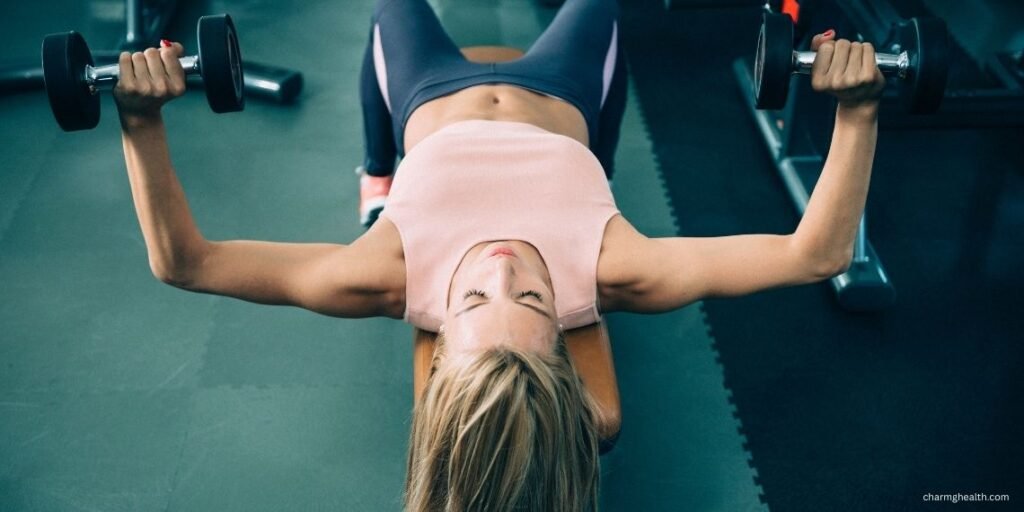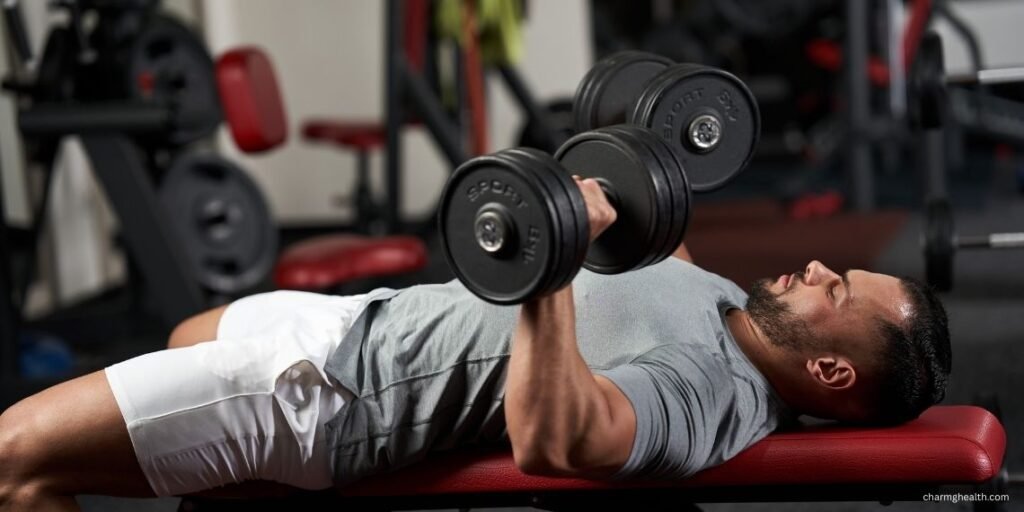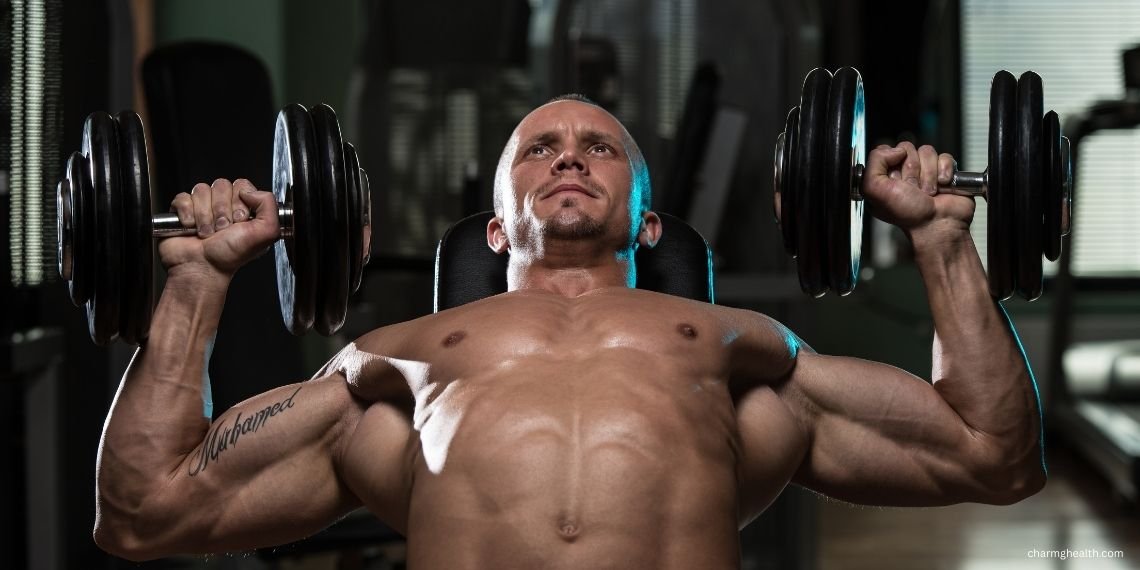Table of Contents
At Charming Health, we focus on exercises that build upper body strength and promote physical fitness. The dumbbell bench press stands out as a versatile move for anyone aiming to enhance their routine. This press exercise uses two dumbbells or a pair of dumbbells to target key areas, making it accessible for home or gym settings. Unlike the barbell bench press, it allows each side to work independently, addressing imbalances. Many people choose this option to build strength and achieve strength gain without needing heavy equipment. As you read on, you’ll see how it fits into various fitness levels.
This exercise resembles the similar to the barbell bench version but offers more freedom in movement. It engages the chest muscle and supports muscle growth through progressive overload. Beginners can start light, while advanced users lift heavy for better results. The dumbbell bench press is similar in setup but demands extra control. Over time, it helps with strength and muscle mass in the upper body. We encourage trying it to feel the difference in chest activation.

What Is the Dumbbell Bench Press?
The dumbbell bench press involves lying on a flat bench and pressing weights upward. It differs from the barbell bench press by using individual dumbbells, which promotes balance. This setup lets you adjust for your weaker side, leading to even development. The motion mimics pushing actions in daily life, like opening a heavy door. It ranks high among bench presses for its adaptability.
In practice, you hold the dumbbells with palms facing forward in a pronated grip. The press starts from the starting position above your chest. Lowering and raising them builds power in the upper arm and shoulder joint. It’s a staple in weight training programs. Compared to the db bench press, which is shorthand for the same, it emphasizes control. Users often report better pectoral engagement.
The dumbbell chest press variation focuses on the pecs and pectoral muscles. It also aids in adduction and elbow extension. For those new to lifting, it provides a gentler entry than fixed bars. The db press allows for neutral grip options too. Overall, this exercise boosts major muscle groups effectively.
Equipment Required
To perform the dumbbell bench press, you need basic items found in most gyms. A sturdy bench supports your back on the bench during the lift. Dumbbells come in various weights for progressive overload. Ensure they match your ability to avoid risk of injury.
Some prefer adjustable benches for angles like incline dumbbell. A mat can substitute if no bench is available, turning it into a dumbbell floor press. Always check for stability to maintain stability throughout.
| Equipment | Options and Alternatives |
|---|---|
| Bench | Flat or adjustable; use floor as alternative for floor press |
| Dumbbells | Hex or rubber-coated; kettlebells if unavailable |
| Mat | Yoga mat for ground-based versions; optional for comfort |
Benefits of the Dumbbell Bench Press
Incorporating the dumbbell bench press into workouts yields multiple advantages. It enhances upper body strength by targeting the chest press area. Unlike the barbell bench press to avoid fixed paths, it allows natural motion, reducing strain on joints. This leads to better muscle growth and strength gain.
The exercise promotes symmetry since each arm works alone. It helps correct imbalances from dominant sides. Additionally, it increases overload capacity over time, allowing you to lift heavy. Many find it safer for solo training without a spotter.
It also boosts overall physical fitness by engaging stabilizers. The dumbbell press improves coordination and endurance. For athletes, it translates to better performance in sports requiring pushes.
Muscles Worked
The dumbbell bench press muscles worked include several key groups. Primarily, it hits the pectoralis major and pecs. These drive the pushing force. The deltoid muscle in the shoulders assists in the lift.
Secondary involvement comes from the triceps, which extend the elbow. Core areas provide support for stability throughout. This full engagement makes it a compound move.
| Muscle Group | Description |
|---|---|
| Primary: Pectoralis Major | Main driver for chest pushing actions |
| Secondary: Triceps | Aids in arm extension during the press |
| Stabilizers: Deltoid Muscle | Supports shoulder movement and balance |
Target Your Triceps with Dumbbell Bench Press
Focusing on the triceps during the dumbbell bench press amplifies arm gains. This muscle extends the elbow in the final push. By emphasizing the lockout, you isolate it more.
Adjust your grip to narrow for extra triceps work. The db bench allows this tweak easily. It complements chest activation without overshadowing it.
Keep form tight to maximize triceps benefits. This approach builds defined arms alongside a strong chest.

How to Perform the Dumbbell Bench Press
Executing the dumbbell bench press requires attention to detail for best results. Begin by selecting appropriate weights to match your level. Position yourself on the flat bench with feet flat on the floor. This base ensures power transfer.
Hold the dumbbells at chest level, then press the dumbbells upward smoothly. Control the descent to engage muscles fully. Repeat for the desired repetition count.
The bench dumbells version demands focus on alignment. Avoid rushing to prevent shoulder discomfort. With practice, it becomes second nature.
Step-by-Step Instructions
Follow these step-by-step instructions for the dumbbell bench press. First, sit on the bench end with dumbbells on your thighs. Lean back slowly, kicking the weights up to shoulder height.
From there, press both dumbbells straight up. Lower them controlled to the sides of your chest. This cycle builds effective habits.
Always maintain a slight arch in your back for support. The process enhances full range of motion safely.
1. Setup Position
In the setup position, lie flat with shoulder blades retracted. Grip the dumbbells firmly in a pronated grip. Position them above your chest with arms extended.
Your feet flat on the floor anchor you. This starting point sets up success for the lift. Engage your core muscles here to maintain form throughout the exercise.
2. Lowering Phase
During the lowering phase, inhale as you bring the dumbbells down. Bend your elbow to about 90 degrees. Keep them flared slightly for optimal stretch.
Control the speed to utilize the stretch reflex. This phase prepares for the powerful ascent. Avoid bouncing at the bottom to protect joints.
3. Pressing Phase
In the pressing phase, exhale and drive the dumbbells upward. Extend your arms fully without locking elbow. Squeeze the pecs at the top for peak contraction.
This motion completes one rep. Focus on even pushing to balance sides. Repeat steadily for consistent gains.
Proper Form and Technique
Maintaining proper form in the dumbbell bench press prevents issues and maximizes effects. Retract your shoulder blades to create a stable base. This protects the shoulder joint during heavy lifts.
Align your wrists straight to avoid strain. The dumbbell bench press form emphasizes controlled movements. Adjust as needed for comfort.
Breathing syncs with actions for better performance. This technique builds trust in your ability over time.
Change Grip and Push to Target Specific Muscles
To change grip and push to target specific muscles, experiment with holds. A neutral grip shifts focus to triceps and inner chest. Rotate palms facing inward for this. Wider grips emphasize outer pecs. The dumbbell bench press using these variations allows customization. Push direction influences activation too. Slight inward arcs hit the upper chest more.
Breathing Patterns
Effective breathing patterns enhance the dumbbell bench press. Inhale deeply on the way down to fill your lungs. This creates intra-abdominal pressure for stability. Exhale forcefully during the press. It aids in power output. Consistent rhythm prevents fatigue. Practice to make it automatic.
Common Mistakes to Avoid
Several pitfalls can hinder the dumbbell bench press. Overarching the back strains the spine. Keep a natural slight arch instead. Flaring elbow too wide risks shoulder injuries. Tuck them at 45 degrees for safety. Using heavy weights without control leads to poor form. Start moderate and progress.
Range of Motion Errors
Range of motion errors often shorten the full range of motion. Not lowering enough limits stretch reflex benefits. Aim for dumbbells near chest level. Overextending downward strains shoulders. Find your comfortable depth. Partial reps miss full engagement. Correct this for better results.
Variations of the Dumbbell Bench Press
Exploring variations of the Dumbbell Bench Press adds diversity. The incline dumbbell press targets the upper chest. Adjust the bench to 30-45 degrees. The decline dumbbell bench press hits lower pecs. Lower the bench head for this. These tweaks keep routines fresh and challenge different areas.
1. Incline Dumbbell Bench Press
The incline dumbbell bench press elevates the upper body. It emphasizes upper chest and deltoid muscle. Set the bench incline properly. Perform as standard but with angled press. This builds a balanced physique. It’s great for aesthetic goals.
2. Decline Dumbbell Bench Press
For the decline dumbbell bench press, position the bench downward. This isolates lower chest muscle. Secure your feet to stay in place. The motion remains similar but shifts emphasis. Use it to round out development. It complements flat versions well.
3. Dumbbell Floor Press
The dumbbell floor press eliminates the bench entirely. Lie on the ground for limited range of motion. This protects shoulders from overstretch. It’s ideal for those with shoulder discomfort. The floor press builds power in the top half.
| Variation | Targeted Muscles |
|---|---|
| Incline Dumbbell Press | Upper Chest, Front Shoulders |
| Decline Dumbbell Bench Press | Lower Pecs, Triceps |
| Dumbbell Floor Press | Mid-Chest, Triceps with less shoulder stress |
Safety and Injury Prevention
Prioritizing safety and injury prevention in the dumbbell bench press matters. Warm up with light sets to prepare joints. This reduces risk of injury. Listen to your body for signs of shoulder discomfort. Stop if pain arises beyond normal fatigue. Use a spotter for heavy weights to assist if needed. Proper setup enhances shoulder safety.
Possible Injuries
Possible injuries include rotator cuff strains from poor form. Overloading causes this often. Pec tears happen with sudden drops. Control weights to avoid. Elbow issues stem from locking joints harshly. Soften the top position.
Alternatives to the Dumbbell Bench Press
If the dumbbell bench press doesn’t suit, try alternatives to the Dumbbell Bench Press. The barbell bench press offers stability with a fixed bar. It allows heavier loads. The dumbbell chest fly isolates pecs through arcs. It complements presses. These options provide similar benefits with twists.
Barbell Bench Press
The barbell bench press uses a single bar for even force. It engages specific muscles like pecs and triceps. Many prefer it for 1rm testing. The barbell and dumbbell comparison shows bars for power, dumbbells for range. It’s a classic for strength gain.
Dumbbell Chest Fly
The dumbbell chest fly stretches the chest horizontally. Hold dumbbells above and lower in arcs. This enhances pectoral width. It’s less joint-heavy than presses. Use lighter weights for form. It aids in muscle growth variety.
Integrating Dumbbell Bench Press into Your Routine
Adding the dumbbell bench press to sessions boosts progress. Pair it with pulls for balance. Do it 2-3 times weekly. Track reps for progressive overload. Adjust based on goals like hypertrophy or strength. Combine with dumbbell shoulder press for full upper work. This creates rounded programs.
For beginners, start with bodyweight variations. Intermediates add weight steadily. Advanced users incorporate dropsets. The press is a variation that fits many plans. Experiment to find your fit.
| Fitness Level | Sample Sets and Reps |
|---|---|
| Beginner | 3 sets of 10-12 reps, light weight |
| Intermediate | 4 sets of 8-10 reps, moderate weight |
| Advanced | 5 sets of 6-8 reps, heavy weight with pauses |
Frequently Asked Questions
1. Is bench press with dumbbells effective?
Yes, the dumbbell bench press is highly effective for boosting upper body strength and muscle growth. I’ve noticed significant gains in my pecs since adding it to my routine regularly.
2. Is a 35 lb dumbbell press good?
A 35 lb dumbbell press works well for beginners or intermediates, helping build a solid foundation. I started with this weight and felt my strength and muscle mass improve over time.
3. Is a 70 lb dumbbell press good?
A 70 lb dumbbell bench press is excellent for advanced lifters aiming to lift heavier, showing great progress. I hit this level recently and saw my chest muscle definition enhance noticeably.
4. Does dumbbell bench press work chest?
Absolutely, the dumbbell bench press targets the chest muscle and pectorals with every lift. I feel a strong chest activation each time I perform it with focus.
5. Does dumbbell bench press build muscle?
Yes, it promotes muscle growth through progressive overload, especially with lifting heavier weights. I’ve experienced steady gains in my upper arm strength over months.
6. Which muscles do dumbbell chest press work?
The dumbbell chest press engages pecs, triceps, and deltoid muscle, offering a full workout. I concentrate on these areas during each repetition for balanced development.
7. Is dumbbell bench press better than barbell?
The dumbbell bench press provides better range and balance, which I prefer over the rigid barbell bench press. It’s helped me correct my weaker side effectively.
8. Does barbell bench press build chest?
Yes, barbell bench press builds chest muscle with heavy loads, though it’s less flexible. I use it occasionally but find dumbbell bench more versatile.
9. Is dumbbell bench press effective?
Definitely, the dumbbell bench press is effective for physical fitness and strength, as I’ve seen in my own progress. It’s a reliable move for consistent gains.
10. What does dumbbell bench press work?
It works pectorals, triceps, and core muscles, giving a solid upper body workout. I feel all these areas activate when I press is good with proper form.
11. Are dumbbell bench presses harder?
Yes, dumbbell bench presses are tougher due to the need for stability, which I found challenging initially. It’s more demanding than the barbell bench press for me.
12. Do dumbbell bench press work triceps?
Yes, triceps get a great workout, especially when I pause at the bottom during the lift. I notice extra engagement in my arms with each press.
13. Does dumbbell bench press work lower chest?
It can target the lower pecs with a decline dumbbell bench press, which I use for variety. Lifting heavier here enhances that lower chest muscle focus.
14. Is dumbbell bench press enough for chest?
It’s a strong start, but pairing it with dumbbell chest fly covers more ground. I combine them to ensure full pectorals development.
15. What does dumbbell bench press target?
It targets pectorals, triceps, and shoulder joint, which I focus on for strength. The press is good for building a balanced upper body when done right.
Conclusion
The dumbbell bench press offers a solid path to better fitness. It targets primary muscles like pecs and triceps effectively. With variations like incline bench press and dumbbell chest fly, you stay engaged.
Practice proper form to enjoy long-term benefits. At Charming Health, we support your journey with practical advice. Keep lifting consistently for results. This exercise proves versatile for all levels. Embrace it to see improvements in strength and confidence.















